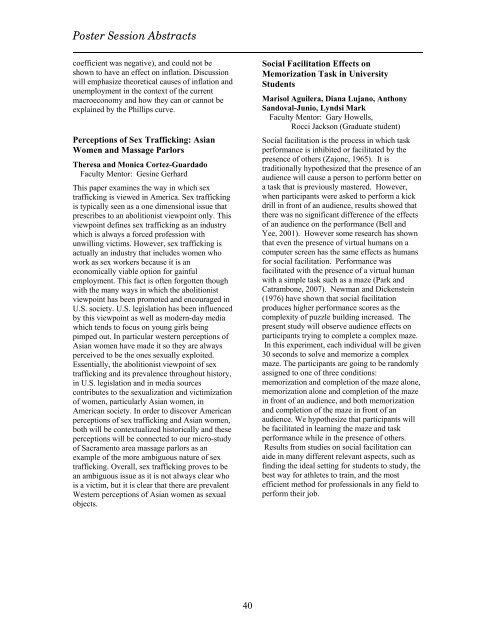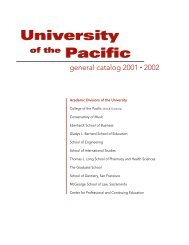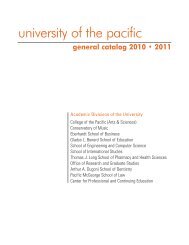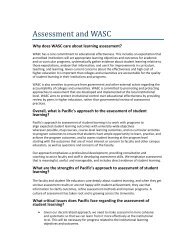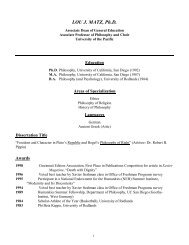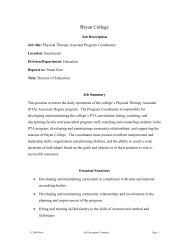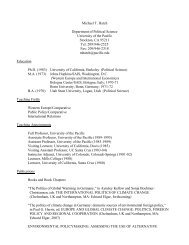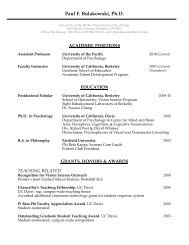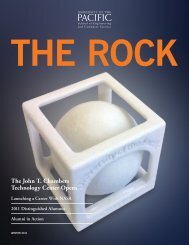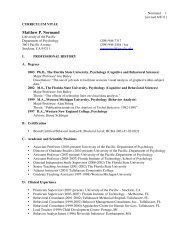purcc 2012 - University of the Pacific
purcc 2012 - University of the Pacific
purcc 2012 - University of the Pacific
Create successful ePaper yourself
Turn your PDF publications into a flip-book with our unique Google optimized e-Paper software.
Poster Session Abstracts<br />
coefficient was negative), and could not be<br />
shown to have an effect on inflation. Discussion<br />
will emphasize <strong>the</strong>oretical causes <strong>of</strong> inflation and<br />
unemployment in <strong>the</strong> context <strong>of</strong> <strong>the</strong> current<br />
macroeconomy and how <strong>the</strong>y can or cannot be<br />
explained by <strong>the</strong> Phillips curve.<br />
Perceptions <strong>of</strong> Sex Trafficking: Asian<br />
Women and Massage Parlors<br />
Theresa and Monica Cortez-Guardado<br />
Faculty Mentor: Gesine Gerhard<br />
This paper examines <strong>the</strong> way in which sex<br />
trafficking is viewed in America. Sex trafficking<br />
is typically seen as a one dimensional issue that<br />
prescribes to an abolitionist viewpoint only. This<br />
viewpoint defines sex trafficking as an industry<br />
which is always a forced pr<strong>of</strong>ession with<br />
unwilling victims. However, sex trafficking is<br />
actually an industry that includes women who<br />
work as sex workers because it is an<br />
economically viable option for gainful<br />
employment. This fact is <strong>of</strong>ten forgotten though<br />
with <strong>the</strong> many ways in which <strong>the</strong> abolitionist<br />
viewpoint has been promoted and encouraged in<br />
U.S. society. U.S. legislation has been influenced<br />
by this viewpoint as well as modern-day media<br />
which tends to focus on young girls being<br />
pimped out. In particular western perceptions <strong>of</strong><br />
Asian women have made it so <strong>the</strong>y are always<br />
perceived to be <strong>the</strong> ones sexually exploited.<br />
Essentially, <strong>the</strong> abolitionist viewpoint <strong>of</strong> sex<br />
trafficking and its prevalence throughout history,<br />
in U.S. legislation and in media sources<br />
contributes to <strong>the</strong> sexualization and victimization<br />
<strong>of</strong> women, particularly Asian women, in<br />
American society. In order to discover American<br />
perceptions <strong>of</strong> sex trafficking and Asian women,<br />
both will be contextualized historically and <strong>the</strong>se<br />
perceptions will be connected to our micro-study<br />
<strong>of</strong> Sacramento area massage parlors as an<br />
example <strong>of</strong> <strong>the</strong> more ambiguous nature <strong>of</strong> sex<br />
trafficking. Overall, sex trafficking proves to be<br />
an ambiguous issue as it is not always clear who<br />
is a victim, but it is clear that <strong>the</strong>re are prevalent<br />
Western perceptions <strong>of</strong> Asian women as sexual<br />
objects.<br />
Social Facilitation Effects on<br />
Memorization Task in <strong>University</strong><br />
Students<br />
Marisol Aguilera, Diana Lujano, Anthony<br />
Sandoval-Junio, Lyndsi Mark<br />
Faculty Mentor: Gary Howells,<br />
Rocci Jackson (Graduate student)<br />
Social facilitation is <strong>the</strong> process in which task<br />
performance is inhibited or facilitated by <strong>the</strong><br />
presence <strong>of</strong> o<strong>the</strong>rs (Zajonc, 1965). It is<br />
traditionally hypo<strong>the</strong>sized that <strong>the</strong> presence <strong>of</strong> an<br />
audience will cause a person to perform better on<br />
a task that is previously mastered. However,<br />
when participants were asked to perform a kick<br />
drill in front <strong>of</strong> an audience, results showed that<br />
<strong>the</strong>re was no significant difference <strong>of</strong> <strong>the</strong> effects<br />
<strong>of</strong> an audience on <strong>the</strong> performance (Bell and<br />
Yee, 2001). However some research has shown<br />
that even <strong>the</strong> presence <strong>of</strong> virtual humans on a<br />
computer screen has <strong>the</strong> same effects as humans<br />
for social facilitation. Performance was<br />
facilitated with <strong>the</strong> presence <strong>of</strong> a virtual human<br />
with a simple task such as a maze (Park and<br />
Catrambone, 2007). Newman and Dickenstein<br />
(1976) have shown that social facilitation<br />
produces higher performance scores as <strong>the</strong><br />
complexity <strong>of</strong> puzzle building increased. The<br />
present study will observe audience effects on<br />
participants trying to complete a complex maze.<br />
In this experiment, each individual will be given<br />
30 seconds to solve and memorize a complex<br />
maze. The participants are going to be randomly<br />
assigned to one <strong>of</strong> three conditions:<br />
memorization and completion <strong>of</strong> <strong>the</strong> maze alone,<br />
memorization alone and completion <strong>of</strong> <strong>the</strong> maze<br />
in front <strong>of</strong> an audience, and both memorization<br />
and completion <strong>of</strong> <strong>the</strong> maze in front <strong>of</strong> an<br />
audience. We hypo<strong>the</strong>size that participants will<br />
be facilitated in learning <strong>the</strong> maze and task<br />
performance while in <strong>the</strong> presence <strong>of</strong> o<strong>the</strong>rs.<br />
Results from studies on social facilitation can<br />
aide in many different relevant aspects, such as<br />
finding <strong>the</strong> ideal setting for students to study, <strong>the</strong><br />
best way for athletes to train, and <strong>the</strong> most<br />
efficient method for pr<strong>of</strong>essionals in any field to<br />
perform <strong>the</strong>ir job.<br />
40


